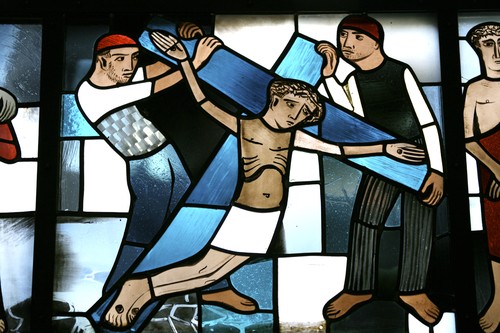No, Jesus Was Not a Socialist—He Is King of Kings

By Dr. Eric M. Wallace
Every so often, especially during heated election cycles or policy debates, a popular argument resurfaces: “Jesus was a socialist.” His compassion for the poor, His call to care for the marginalized, and His warning against excessive wealth accumulation are offered as evidence that Christ would support the redistribution of wealth through government.
Let’s be clear: Jesus is not a socialist. He is not a capitalist, either. Jesus is the Son of God, the King of Kings. He transcends political ideologies.
It’s true that Jesus spoke powerfully about the poor and warned the rich about their attachment to wealth. But here’s what He did not do: He did not demand that Caesar raise taxes to feed the poor. He did not preach that the Roman Empire should seize property in the name of equity. And He certainly did not lay out a political platform for government-controlled economics.
Instead, Jesus called individuals and the Church—His followers—to live generously, sacrificially, and with compassion. The command to care for “the least of these” (Matthew 25:40) is directed at disciples, not the state.
A Kingdom, Not a Welfare State
Jesus didn’t come to reform the Roman tax code. He came to establish a Kingdom, not of this world (John 18:36), but one that would transform hearts, communities, and ultimately all of creation. His mission was not to redistribute wealth but to reconcile sinners to God.
Socialism, as a political ideology, advocates the coercive redistribution of resources by the state. Jesus, on the other hand, invites us to give freely, to surrender our lives and possessions not to government agents, but to the will of the Father.
The early Church in Acts shared all things in common—not because of government mandate, but through the voluntary work of the Holy Spirit (Acts 2:44-45; 4:32-35). When Ananias and Sapphira lied about their giving, Peter reminded them that their property belonged to them until they chose to give it (Acts 5:4). That’s not socialism. That’s Spirit-led generosity.
The Government Has Its Role—But It Is Not the Church
Romans 13 makes it clear: government exists to administer justice, not charity. Scripture calls the state to restrain evil, punish wrongdoers, and protect the innocent, not to function as a benevolent provider. When we blur those lines, we replace the Church’s mission with Caesar’s bureaucracy.
In fact, entrusting care for the poor to the government often results in inefficiency, dependency, and the erosion of dignity. Biblical compassion is rooted in relationship, accountability, and transformation, not impersonal handouts.
Jesus Offers a Better Way
The message of Jesus is radically different from political sloganeering. He offers a Kingdom not based on envy, but on grace; not on coercion, but on conviction. His call to the rich young ruler was personal: “Go, sell what you have and give to the poor… and follow me” (Mark 10:21). The tragedy wasn’t wealth—it was the man’s unwillingness to surrender.
Jesus will one day return to establish His own Kingdom—one of righteousness, justice, and peace (Isaiah 9:6-7). Until then, He calls His people, not Washington, to care for the poor, defend the vulnerable, and proclaim liberty to the captives.
Let’s stop remaking Jesus in our political image.
He is not a socialist.
He is the Sovereign King, and His Kingdom will have no end.
Every so often, especially during heated election cycles or policy debates, a popular argument resurfaces: “Jesus was a socialist.” His compassion for the poor, His call to care for the marginalized, and His warning against excessive wealth accumulation are offered as evidence that Christ would support the redistribution of wealth through government.
Let’s be clear: Jesus is not a socialist. He is not a capitalist, either. Jesus is the Son of God, the King of Kings. He transcends political ideologies.
It’s true that Jesus spoke powerfully about the poor and warned the rich about their attachment to wealth. But here’s what He did not do: He did not demand that Caesar raise taxes to feed the poor. He did not preach that the Roman Empire should seize property in the name of equity. And He certainly did not lay out a political platform for government-controlled economics.
Instead, Jesus called individuals and the Church—His followers—to live generously, sacrificially, and with compassion. The command to care for “the least of these” (Matthew 25:40) is directed at disciples, not the state.
A Kingdom, Not a Welfare State
Jesus didn’t come to reform the Roman tax code. He came to establish a Kingdom, not of this world (John 18:36), but one that would transform hearts, communities, and ultimately all of creation. His mission was not to redistribute wealth but to reconcile sinners to God.
Socialism, as a political ideology, advocates the coercive redistribution of resources by the state. Jesus, on the other hand, invites us to give freely, to surrender our lives and possessions not to government agents, but to the will of the Father.
The early Church in Acts shared all things in common—not because of government mandate, but through the voluntary work of the Holy Spirit (Acts 2:44-45; 4:32-35). When Ananias and Sapphira lied about their giving, Peter reminded them that their property belonged to them until they chose to give it (Acts 5:4). That’s not socialism. That’s Spirit-led generosity.
The Government Has Its Role—But It Is Not the Church
Romans 13 makes it clear: government exists to administer justice, not charity. Scripture calls the state to restrain evil, punish wrongdoers, and protect the innocent, not to function as a benevolent provider. When we blur those lines, we replace the Church’s mission with Caesar’s bureaucracy.
In fact, entrusting care for the poor to the government often results in inefficiency, dependency, and the erosion of dignity. Biblical compassion is rooted in relationship, accountability, and transformation, not impersonal handouts.
Jesus Offers a Better Way
The message of Jesus is radically different from political sloganeering. He offers a Kingdom not based on envy, but on grace; not on coercion, but on conviction. His call to the rich young ruler was personal: “Go, sell what you have and give to the poor… and follow me” (Mark 10:21). The tragedy wasn’t wealth—it was the man’s unwillingness to surrender.
Jesus will one day return to establish His own Kingdom—one of righteousness, justice, and peace (Isaiah 9:6-7). Until then, He calls His people, not Washington, to care for the poor, defend the vulnerable, and proclaim liberty to the captives.
Let’s stop remaking Jesus in our political image.
He is not a socialist.
He is the Sovereign King, and His Kingdom will have no end.

Dr. Eric M. Wallace is a trailblazing scholar, dynamic speaker, and passionate advocate for faith-based conservatism. With a distinguished academic background and an unwavering commitment to biblical truth, Wallace has become a leading voice challenging cultural and political narratives that conflict with a biblical worldview.
Wallace holds postgraduate degrees in biblical studies (M.A., ThM, Ph.D.), Wallace is the first African American to earn a Ph.D. in biblical studies from Union-PSCE (now Union Presbyterian Seminary). His scholarship and ministry experience equip him to address today’s most pressing sociopolitical issues through the lens of faith, reason, and historical accuracy.
Wallace holds postgraduate degrees in biblical studies (M.A., ThM, Ph.D.), Wallace is the first African American to earn a Ph.D. in biblical studies from Union-PSCE (now Union Presbyterian Seminary). His scholarship and ministry experience equip him to address today’s most pressing sociopolitical issues through the lens of faith, reason, and historical accuracy.
Recent
The Heart of the Matter Is the Matter of the Heart
February 14th, 2026
People of Color can also steal…Duh?
February 14th, 2026
The Monroe Doctrine Isn’t Outdated — It’s Vital for American Security
January 5th, 2026
Defining Racism “UP”
January 4th, 2026
The Voting Rights Act Should Protect Voting—Not Perpetuate Fear
January 4th, 2026
Archive
2026
2025
February
March
July
September
October
November
2024
January
Cartoon 01/01/24Cartoon 01/02/24Claudine Gay Betrayed the American Values of My Black Elders to Exploit White GuiltCartoon 01/03/24Cartoon 01/05/24Cartoon 01/06/24Cartoon 01/07/24Cartoon 01/08/24We need a David, not a SaulCartoon 01/13/24Cartoon 01/09/24Cartoon 01/10/24Cartoon 01/11/24Cartoon 01/14/24Cartoon 01/12/24What Happens to a King Deferred? A ReduxCartoon 01/15/24Cartoon 01/16/24The Good Guys with Guns Part 1Cartoon 01/17/24America Works. DEI Doesn’t.Cartoon 01/18/24Cartoon 01/23/24Good Guys with Guns Part 2Cartoon 01/19/24Cartoon 01/21/24Cartoon 01/22/24Cartoon 01/24/24Cartoon 01/26/24Cartoon 01/25/24Cartoon 01/27/24
February
Cartoon 02/04/24Cartoon 02/03/24Cartoon 02/02/24Cartoon 02/01/24Cartoon 01/31/24Cartoon 01/28/24Cartoon 01/29/24We’ve Been Gay(ed) Part 1Cartoon 02/05/24Cartoon 02/06/24Cartoon 02/07/24Cartoon 02/08/24Cartoon 02/13/24Cartoon 02/12/24Cartoon 02/09/24Cartoon 02/11/24Cartoon 02/10/24Cartoon 02/19/24'Black America at Crossroads’ of Culture Wars as Presidential Election LoomsWe’ve Been Gay(ed) Part 2Cartoon 02/18/24Cartoon 02/17/24Cartoon 02/16/24Cartoon 02/15/24Cartoon 02/14/24Cartoon 02/22/24Cartoon 02/21/24Cartoon 02/20/24America Needs a “Black Wives Matter” Movement To Rebuild the Black FamilyCartoon 02/23/24Cartoon 02/24/24Cartoon 02/25/24Cartoon 02/26/24Cartoon 02/27/24

2 Comments
Jesus gave handouts in the form of: food, wine, healthcare. He abhorred wealth and greed. Jesus said if you are rich, you're unlikely to get into Heaven at all!
nIf Jesus came back now, he would be horrified by the inequality in our world.
n
nBtw calling yourself a trailblazing scholar isn't very humble, is it?
You're not serious, are you? Entrance into heaven is not based on our righteousness, but his. He didn't abhor wealth. He abhorred covetousness. Read the Ten Commandments. You seem to forget that Job, Abraham, and even the disciples, after the great catch of fish, were not poor. Lastly, you seem to miss the other part of the verse that deals with the rich getting into heaven, Mark 10:17. Jesus is responding to the rich man who asked him how to inherit eternal life. Jesus names the commandments that dealt with perfunctory obedience. Meaning he has not committed murder, adultery, stealing, etc. He claims to have kept those commandments. However, Jesus points out his lack. He is asked to sell everything and give it to the poor, then come follow him and receive treasure in heaven. He leaves "disheartened" because he had great possessions. Then Jesus uses this as a teaching moment that it is difficult to (not impossible) for those with wealth to enter the Kingdom. It's not the wealth that stops him; it's his inability to follow Jesus. It's his reluctance to recognize who Jesus is and obey what Jesus told him to do. Rich people are tempted to be their own God and trust in their rich for security instead of God. To be a disciple, one must be willing to walk away from it all--"to have no other gods before me." The disciples are incredulous because, for them, being rich meant God had blessed them. As you read the gospels, it is our attitude toward riches. Wealth should be used to build the kingdom and help others. Mark 10:27, which you failed to read, says that "with man it is impossible, but not with God. For all things are possible with God." Meaning a rich man can enter heaven. What is needed is a relationship that is demonstrated by faithful obedience. The Rich man called Jesus a good teacher, not Lord. Then he refused to do what he was told.
nBe careful that your self-righteousness does not blind you from following the teachings of our Lord. Take the log out of your eye before you take the splinter out of mine.